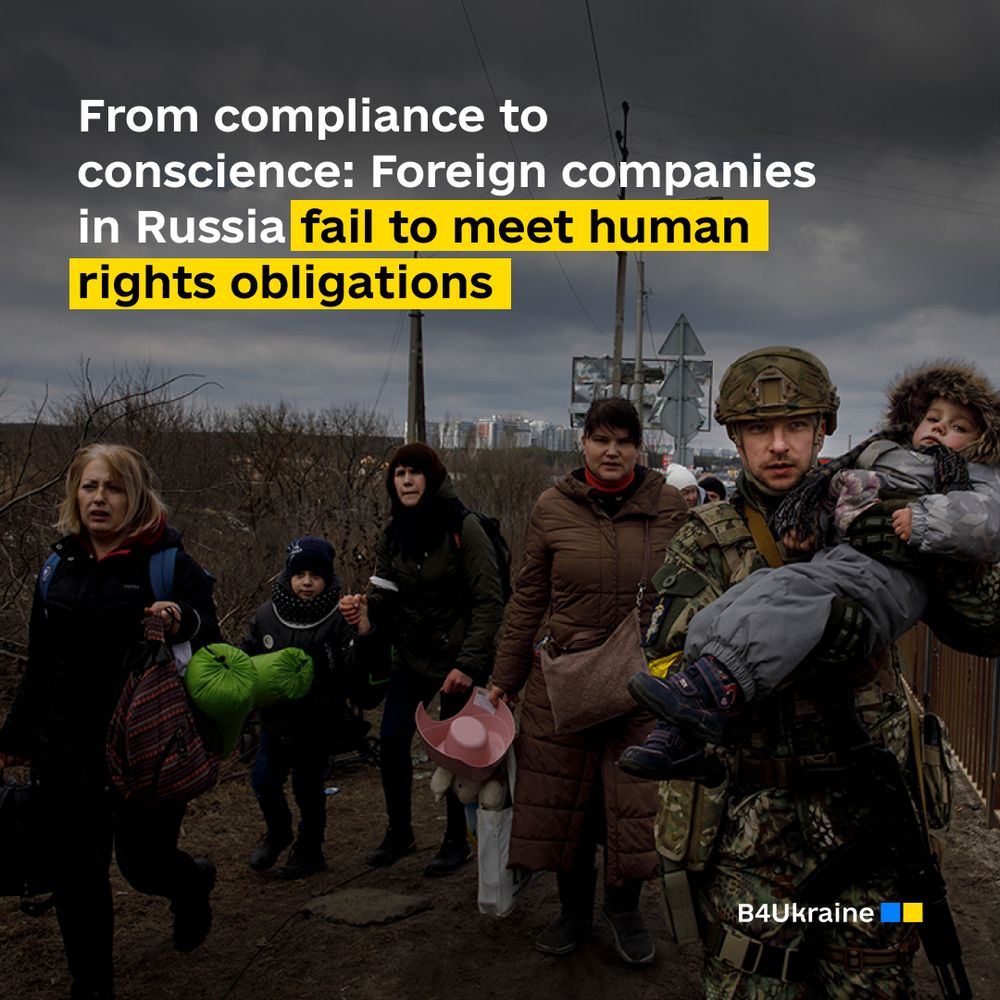
The Russian invasion of Ukraine has put global companies doing business in the aggressor state on the red line of becoming complicit in war crimes and serious human rights violations committed by the Russian Armed Forces.
The United Nations Guiding Principles on Business and Human Rights (UNGPs) call on any company involved in a conflict zone to conduct heightened due diligence to assess risks of complicity in human rights abuses through business activities. If the results of such assessment reveal risks that cannot be addressed, the companies must seek to withdraw responsibly.
Since the start of the full-scale invasion, the B4Ukraine Coalition has engaged with 125 multinational companies to call for a responsible business exit from Russia based on respect for human rights.
A report summarizing B4Ukraine’s engagement shows that only 40% of contacted companies provided responses, while 60% are not taking responsibility under the UNGPs, which obliges them to enter meaningful dialogue with relevant stakeholders, seriously.
The analysis of the engagement highlights three key findings:
- Multinationals doing business in Russia may be compliant with sanctions, but they are failing to meet their obligations to protect human rights.
- Companies cite three main reasons to remain: essentiality, employee safety, and sanctions compliance.
- Further government action and regulation are needed to promote the expected standard of corporate conduct, encourage responsible disengagement from Russia, and promote ethical business practices. This includes, but is not limited to, issuing business advisories.
Last year international companies operating in Russia made over $213.9 billion in revenues through their local Russian businesses and paid about $3.5 billion in profit taxes to the Kremlin. This implies indirect financing of the war and the severe breaches of international human rights and humanitarian law in Ukraine. Moreover, companies with assets and staff in Russia already face heightened risks of complicity in war crimes. The ‘partial mobilization’ order, introduced by Putin in September 2022, opened the door for the Russian government to force any company operating within Russia to enlist its employees and provide information and resources to support the war effort.
Our analysis reveals that companies left in Russia either demonstrate indifference or a complete lack of understanding of their responsibilities as outlined in the UNGPs and the wider international framework on business and human rights. While some justifications they use to continue operating in Russia may seem valid on the surface, the analysis shows that these are mere excuses.
A significant portion of companies justify their presence in the Russian market by relying on the blanket argument of providing essential goods and services, employee safety concerns, and legal, administrative, and regulatory complexities that are only due to increase as the war drags on. Many of these arguments are unwarranted, unsubstantiated, and, in certain cases, cynical.
- Essentiality: When asked questions and elaborations on essentiality such as “What is your definition of essentiality; What products do you consider essential; What products are not considered essential?”, none of the companies provided detailed answers. This includes large FMCG/food & beverage companies such as Mondelez, Nestle, Mars, and PepsiCo.
- Employee safety: Similarly, B4Ukraine never received concrete responses to questions such as “How many conscription notices has the company delivered; How does the company reconcile its claims of concern over its Russian employees with their continued operations in the country, which obliges them to deliver conscription notices; How many employees have been drafted, sent to the battlefield, and killed?” This includes companies like Philip Morris, Japan Tobacco International, and Pernod Ricard.
- Sanctions compliant: All companies emphasize that they are compliant with sanctions. However, they fail to notice that sanction compliance is not the same as meeting their responsibilities under the international standards for business and human rights.
Businesses must understand that they are not mere bystanders, but potential contributors to the illegal war against Ukraine. The devastating toll of this aggression on Ukrainian lives cannot be overlooked. With over 25,000 innocent civilians killed or injured and the number of reported war crimes exceeding 99,000, the human suffering is unimaginable.
“The time has come for businesses to grasp the gravity of their actions and their moral responsibility in the face of such atrocities. By choosing to continue their operations in Russia, these companies inadvertently support and enable the continuation of this destructive conflict. They become accomplices, directly or indirectly, to the suffering and loss experienced by countless Ukrainian families,” — said Nina Prusac, B4Ukraine business and human rights consultant.
The choice is in the hands of businesses. Are they willing to be complicit in this illegal war, or will they move from compliance to conscience? The decision they make today will shape the lives of countless Ukrainians. We implore them to choose wisely.